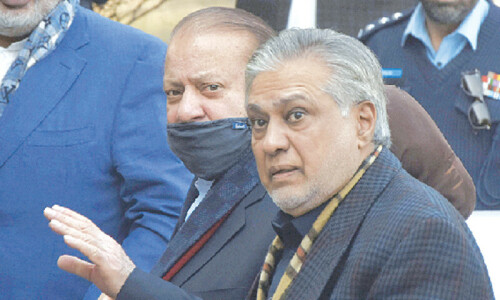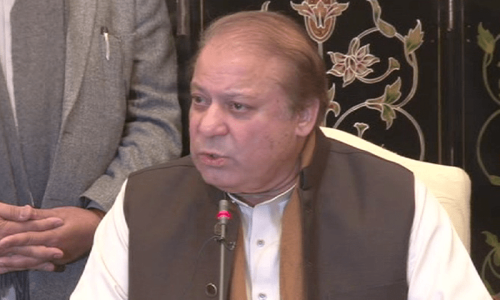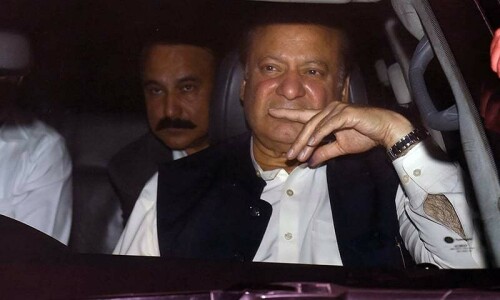PML-N supremo Nawaz Sharif on Tuesday cleared yet another legal hurdle ahead of the Feb 8 general election after the Islamabad High Court (IHC) acquitted him in the Al-Azizia reference.
A two-judge bench comprising IHC Chief Justice (CJ) Aamer Farooq and Justice Miangul Hassan Aurangzeb announced the verdict, which was reserved earlier in the day, while hearing Nawaz’s appeal against his conviction in the Al-Azizia reference.
The Al-Azizia case was one of the two graft references that Nawaz was convicted in. He was acquitted in the Avenfield reference on Nov 29 by the same bench.
Nawaz still remains disqualified from holding public office by the Supreme Court (SC) in the Panama Papers case, and in a later judgment interpreting Article 62(1)(f) of the Constitution — the provision that involves honesty and trustworthiness — the top court ruled that the disqualification is for life.
However, earlier this year amendments were made to the Elections Act, 2017, limiting the disqualification of lawmakers to five years with a retrospective effect.
The SC has decided to form a larger bench to determine once and for all whether aspirants disqualified under Article 62(1)(f) can contest polls in light of the amendments in the Elections Act, 2017.
Further, the Al-Azizia Steel Mills corruption reference, in which Nawaz was acquitted today, pertains to a case in which he was sentenced to seven years in jail on Dec 24, 2018. He was also fined Rs1.5 billion and US$25 million.
It pertains to the Sharifs being unable to justify the source of the funds provided to set up Al-Azizia Steel Mills and Hill Metal Establishment (HME) in Saudi Arabia.
The IHC had declared him a proclaimed offender in the case in December 2020. After leaving for London on medical grounds, Nawaz remained there for nearly four years and only returned to the country in October this year.
Soon after his return, Nawaz had formally filed two separate applications seeking restoration of his appeals against the conviction in reference.
In the application, the PML-N supreme leader had said that while he was abroad for medical treatment, the pending appeals were dismissed for non-prosecution. The application requested the court to revive the pending appeals to decide on these pleas on merit.
The IHC had on Oct 24 revived Nawaz’s appeals in the two reference.
At the previous hearing, the court had turned down the National Accountability Bureau’s (NAB) suggestion that Nawaz’s conviction in the reference be set aside and the case be re-tried. It had also declared that it would decide the PML-N supremo’s appeal on merit.
Ahead of today’s hearing, Nawaz arrived in court alongside senior PML-N leaders, including Ishaq Dar and Azam Nazeer Tarar.
PML-N rejoices at Nawaz’s acquittal

After the IHC announced the verdict, PML-N workers distributed sweets outside the court as others chanted slogans in favour of Nawaz. Speaking to the media, PML-N’s Dar congratulated the nation on today’s verdict.
PML-N President Shehbaz Sharif said his brother had been “vindicated once again”.
“The sham cases created to disqualify a sitting prime minister are finally meeting their fate,” he said in a post on X.
“The seven years wasted were not just a personal loss but a loss of development and prosperity of Pakistan,” he said, as he expressed the hope that the country would prosper once again under Nawaz’s leadership.
PML-N’s Marriyum Aurangzeb said that Nawaz had been “acquitted in all cases”.
“The reality of these fake and false cases has been exposed before the public,” she said in a post on X. “God Willing, Nawaz will become premier for a fourth time with the people’s vote,” she said.
She also shared videos of a smiling Nawaz being congratulated by lawyers inside the courtroom.
PML-N leader Khawaja Asif said his party chief had entrusted his affairs to God and had been vindicated. However, he said that what the PML-N supremo had to bear over the years could never be made up for.
In a post on X, Asif said the nation would have to decide on election day who would answer for the “destruction wrought” over the past few years and called on the people to come and vote for Nawaz.
Today’s hearing
At the outset of the hearing, Nawaz’ lawyer Amjad Pervaiz came to the rostrum and told the court that he wanted to argue on the matter of Nawaz’s dependents.
However, IHC CJ Farooq pointed out that the PML-N lawyer had completed his arguments in the case. Pervaiz insisted that he wanted to argue on one point in this regard.
The court then asked whether NAB had proven anything related to Nawaz’s dependents. The lawyer responded that one of the witnesses, Wajid Zia, had admitted that there was no evidence pertaining to Nawaz’s dependents.
He said that there were several court verdicts present regarding the definition of benami. Pervaiz then presented 13 separate verdicts in benami cases. He contended that the legal team had also raised its objections in front of the trial court that convicted Nawaz.
He said that the trial court had relied on three major points. Nawaz’s lawyer said that the trial court had kept the civil miscellaneous applications filed in the Panama case as the basis.
“All three civil miscellaneous applications were filed by Maryam Nawaz, Hassan Nawaz and Hussain Nawaz,” he contended. He highlighted that not a single civil miscellaneous application was filed by Nawaz.
“In its judgement, the trial court held that the civil miscellaneous applications were criminal material,” the lawyer said. “Not a single application proves that Nawaz was the owner of these assets,” he said.
At one point, the IHC CJ asked about the contents of the civil miscellaneous applications. “The applications were not placed on record. Documents related to them were placed on record,” Pervaiz responded.
He reiterated that the applications did not state that Nawaz owned the assets, adding that they instead stated that the matter did not concern the PML-N supremo.
“It is a principle that evidence in one case cannot be admissible in another. Especially when the nature of both cases is separate,” he said.
Pervaiz further said that the trial court also relied on an interview given by Hussain Nawaz to a private TV channel in 2016. “Even though Hussain was saying in the interview that the matter did not concern Nawaz,” he said.
Nawaz’s lawyer further said that an accused was innocent until proven guilty. He said that the onus was on the prosecution to prove the charges against the accused. “The burden of proof is on the prosecution, not the accused,” Pervaiz said.
“The accused cannot be forced to prove his innocence,” he said. Nawaz’s lawyer said that there was no previous assets case where the accused was convicted without presenting clear proof of ownership.
“The prosecution could not present a single piece of evidence. Therefore, the the burden of proof cannot be transferred onto the accused,” he said as he wrapped up his arguments.
The NAB prosecutor, Azhar Maqbool Shah, then came to the rostrum and began his arguments. He said that a references were filed in accountability courts on the directives of the SC. He further said that a joint investigation team (JIT) was formed to probe the NAB references.
He said that the accountability watchdog conducted its own investigation. “In cases concerning assets, there are only two to three methods of investigation,” he said, adding that all the evidence collected was part of the record.
These also included statements recorded under Section 161 of the Code of Criminal Procedure, he said. He also read out loud some parts of Nawaz’s indictment.
“Al-Azizia and Hill metal are the two prime allegations. Tell us when the Al-Azizia allegations were brought,” asked the IHC CJ. “You were the prosecutor. Tell us what evidence you possessed. Tell us on what basis you transferred the burden of proof onto the accused,” he said.
“Leave the law. We have the read the laws. Come straight to the prosecution,” the IHC CJ told the NAB lawyer. “Is there any evidence on record? Is there any witness present?” he asked.
Shah said that Nawaz was indicted on charges of corruption and corrupt practices. Witnesses from the Securities and Exchange Commission of Pakistan (SECP) and the Federal Board of Revenue (FBR) were presented in court, he said.
“This is a case of white collar crime,” he said. Shah further said that evidence was collected from across the country and said that letters were also written to collect evidence from abroad.
The IHC CJ then asked the NAB lawyer to tell the court about the evidence which it was linking to the case. There must be some documents pertaining to the ownership of assets, he remarked.
“Before going into the evidence, I would like to clear up a confusion. At the previous hearing, you had asked for the case to be remanded back to the trial court,” Justice Aurangzeb said.
“We have not yet passed an order. You can maintain the conviction while arguing on the merits of the appeal,” he remarked.
For his part, Shah conceded that the bureau had asked for the case to be remanded back to the trial court.
He said that after the SC verdict concerning judge Arshad Malik — who had convicted Nawaz in the case — and his subsequent dismissal, the “verdict cannot be called accurate”. He said that the trial court’s verdict in the Al-Azizia case was “biased”.
The IHC CJ then said that the court did not pass an order on the petition concerning judge Arshad Malik. He noted that NAB had stated that it did not want further proceedings on the matter.
“The NAB lawyer is correct in saying that the SC’s observations in the Arshad Malik case were quite strong,” Justice Farooq remarked. He said that the IHC would have kept this in mind if the NAB had not filed an application on the matter.
Shah then began arguing on the merits of the case. At this, the IHC CJ said, “You will have to provide evidence that all of this happened through corruption.”
The NAB lawyer said that according to the JIT formed by the SC, the assets in question were acquired through corrupt practices. However, the IHC CJ pointed out that the JIT’s lead witness, Wajid Zia, was saying that he had no evidence to prove this.
“This is all based on conjecture. A conviction cannot be handed down based on conjecture. If there is evidence then tell us,” Justice Farooq said.
Shah further said that most of the documents placed on record in the case were photocopies. At this, the court asked how photocopies, not the original documents, were a part of the case record.
Tarar then chimed in, saying, “Till date, we have not received even a certified copy of the photocopied documents.”
The NAB prosecutor said that Nawaz’s sons did not possess the means to set up mills, at which the IHC CJ asked how the case was linked to the PML-N supremo.
“That’s what I am saying, that Nawaz’s sons did not possess enough means [to set up mills,” Shah said.
“We cannot talk on conjecture. Tell us how Nawaz was involved in corruption and corrupt practices. Star witness witness Wajid Zia has said that there is no evidence. It is also clear that the businesses were Nawaz’s,” Justice Farooq remarked.
The court then reserved its verdict in the case.














































Dear visitor, the comments section is undergoing an overhaul and will return soon.